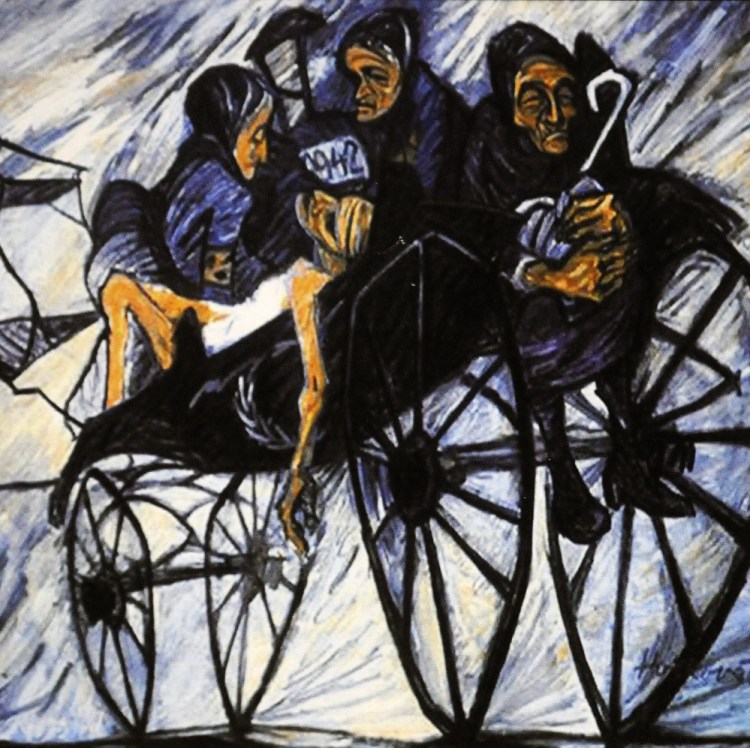Every April I remember and mourn. I mourn my maternal Jewish grandfather and the 12 uncles and aunts and their extended families murdered in the Holocaust by the evil that we call genocide. But I am comforted to some extent by the knowledge that I am not alone. Other communities share this month to commemorate their own genocides. Armenians, Cambodians, Rwandans and Darfuris share with me membership in a horrific fraternity/sorority of sorrow. It is a group that knows no divisions or boundaries of color, religion, gender or geography. That is because genocide is an equal opportunity killer. It strikes out against them all.
Who are they, these generations of genocide? Our great Holocaust voice, the late Elie Wiesel, a survivor of Auschwitz, tried to describe them:
“You must look at them carefully. Their appearance is deceptive … they laugh, they love. They seek what others seek. But it isn’t true. Anyone who has seen what they have seen cannot be like the others, cannot laugh, love, pray, bargain, suffer, have fun or forget like the others. You have to watch them carefully when they pass something that reminds them of that other time, of that horror they endured. Something in them shudders and makes you turn your eyes away. These people have been amputated; they haven’t lost their legs or their eyes but their will and their taste for life. The thing that they have seen will come to the surface again sooner or later and it will bury itself in the generation that follows.”
We, the generations of genocide, bear a soul wound.
Soul wound is not my term. It has been an integral part of Native American people’s knowledge since Columbus landed in this hemisphere. What is a soul wound? When this nation was colonized, many Native Americans were killed and herded like cattle onto reservations because of who they were. The killing eventually stopped; the wounds to the body healed. But the mind did not heal, and the pain lasted for generations and continues to last because the wound was to the soul of the human being.
When this nation enslaved and killed African-Americans because of who they were, the killing eventually stopped, and now slavery and Jim Crowism seem to be a thing of the past. The wounds of the body healed. The mind’s wounds did not, and the pain lasted and continues to last for generations because the wound was to the soul of the human being.
It has been estimated that more than 35 million people died in the 20th century’s international and domestic wars. But it has also been estimated that more than 170 million were murdered – and continue to be murdered – in massacres and mass executions carried out by countries in which they were living.
Since 1948, we have had a term to define that kind of mass killing, what Winston Churchill called “the crime without a name.” We call it genocide. It is a word coined by the late jurist Raphael Lemkin, with roots in the Latin and in the Greek. It means the killing of a group based on race, religion, gender or a whole host of other reasons.
Why do the killers want to kill? One of the Rwandan genocide murderers stated that “the killers did not know that the Tutsis were human beings because if they had thought about that they wouldn’t have killed them. Let me also include myself as someone who accepted it. I wouldn’t have accepted that they, the Tutsi, are human beings. As I was hearing it, I had the same perception as others at the time.” Here is the frightening part: He also stated that what he did “was a dark cloud that came into people’s hearts and covered them, and everything became dark because to see someone standing in front of you without any energy and you hold your machete high or a club and hit him … it is something difficult that was done with a lot of anger and rage, I mean this genocide.”
Is this the dark cloud that lurks in all of us just waiting to emerge if the circumstances are right and we no longer see the victim as a human being?
But the murderers murdered and the dead cannot be brought back to life. What do we do with our memories and with our soul wounds, those of us who bear the burden of our genocides? And how can humanity begin to understand the “other” in its midst as our brothers and sisters?
Copy the Story LinkSend questions/comments to the editors.



Success. Please wait for the page to reload. If the page does not reload within 5 seconds, please refresh the page.
Enter your email and password to access comments.
Hi, to comment on stories you must . This profile is in addition to your subscription and website login.
Already have a commenting profile? .
Invalid username/password.
Please check your email to confirm and complete your registration.
Only subscribers are eligible to post comments. Please subscribe or login first for digital access. Here’s why.
Use the form below to reset your password. When you've submitted your account email, we will send an email with a reset code.